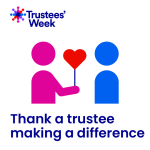Reclaiming Narratives, an interview series: Gabriel and Genevieve
Reclaiming Narratives: an interview with Gabriel and Genevieve
Written by Samie John, Project Manager at ELBA
Black History Month is an opportunity to reflect on and celebrate the incredible contributions of Black people in the UK. 2024’s theme is Reclaiming Narratives, suggesting taking back something that was once lost or taken. In this interview with two Black professionals from investment management firm Brown Advisory, I wanted them to ponder what it means to reclaim your own narrative.
How do you interpret this theme, and what does it mean to you in your life and career?
Gabriel Osamor, Senior Business Intelligence Analyst at Brown Advisory:
“This theme has made me reflect on my career, especially considering that we work in an industry where Black professionals are underrepresented, particularly in decision-making roles. Less than 1% in the UK, in fact. Sometimes, it can feel like you’re not enough.”
“For me, reclaiming my narrative means believing in my abilities. I’m hardworking and passionate about finance and investment management, and I’ve earned several industry qualifications. Reclaiming my narrative means putting myself forward for opportunities, regardless of my background or skin colour, and knowing that I deserve to be on a level playing field with other professionals. It’s about portraying myself in the best possible light and believing that I’m capable of achieving my goals.”
Genevieve Barry, Private Client Operations Associate at Brown Advisory:
“For me, it’s about being empowered to be comfortable with who you are. When I think back to starting new jobs, there’s always that initial warming-up period where you’re figuring out how much of yourself to share. Looking back, I wish I had the confidence to be my true self from the start. People begin to really buy into who you are over time, but I believe I could have engaged more deeply if I’d had that confidence sooner.
“I also echo what Gabriel said—reclaiming your narrative is about having confidence in yourself and your career trajectory, believing that you’re good enough. Sometimes, with the lack of diversity in the industry, it’s hard to picture yourself advancing. But reclaiming the narrative is about knowing that you can be the one to pave the way.”
Can you both share a moment when you embraced your own power in the workplace despite any barriers or challenges?
Genevieve Barry:
“I think there have been moments at work where conversations happen, and I hesitate to share my opinion unless I feel it’s meaningful. I don’t like to speak just for the sake of it. But over time, I’ve realised that by holding back, I’m undervaluing my perspective. Things I might not think are important can actually be valuable to others because they might not be thinking the same way. So, realising that my voice and perspective matter has been a key part of embracing my power.”
Gabriel Osamor:
“People who know me will say I have a unique perspective on things. I think differently, and that’s something I’ve always been proud of. For example, last year, I advocated for the firm to sponsor Black Women in Asset Management. It was a conversation we hadn’t had before, but I was passionate about it, and now multiple Black women, including some of our partner firms, have won awards thanks to that sponsorship.
“It’s about being brave enough to start those conversations, even if they haven’t happened before.
“In the industry, Black women face significant challenges — over 50% don’t want to stay in their current employment for more than two years. Looking at these statistics and being an advocate, I knew I had to speak up.
“If you have ideas, don’t be afraid to share them. Sometimes they might not be accepted right away, but don’t give up. Be resilient and use your voice. Every Black professional brings a unique perspective, and that’s powerful. Whether it’s finance or investment management, many of us are one of the few, or sometimes the only one, in the room.”
Genevieve Barry:
“One more thing to add: we have a women’s group within the company, and one of the senior women gave advice that really applies here. She said that as a senior woman, she makes it a point to speak up in meetings because it’s important for other women in the office to see that. If women don’t speak, it doesn’t empower or instil confidence in others. The same goes for Black employees. If I came into a company where another Black person was fading into the background, I might feel the need to do the same. So, it’s important to be visible and vocal because others are watching.”
What can organisations do to effectively drive real change? And where do you think organisations fall short?
Gabriel Osamor:
“First, it’s essential for organisations, particularly in financial services and investment management, to be intentional about not expecting Black talent to fit into the same cultural norms. They need to make an effort to integrate Black professionals in a way that respects their beliefs and values. It’s also critical not to hire Black professionals only for operational roles. Organisations should create clear pathways for Black professionals to move into investment roles. In our industry, this lack of opportunity is common, and some organisations aren’t doing enough to address it.
“It’s important for firms to have diverse teams, especially at the senior level, because decision-making happens there. Without diversity at the top, people simply don’t get it. Less than 1% of senior roles are held by Black professionals. We need to manage upwards and make sure we’re speaking to decision-makers, getting buy-in, and being heard.”
Genevieve Barry:
“I think our connection with ELBA has been a great example of this. I’ve never worked at a place that puts so much effort into connecting and growing diverse talent. It’s important that we have these conversations and that senior leaders are engaged and interested in understanding our perspectives.
“One of the challenges is that in smaller office environments, people know they’ll be one of the few, and that can be intimidating. I’ve worked at larger companies where more people look like me, but I felt like I could fade into the background. Here, in a smaller firm, we’re more exposed, but we also have more opportunities to make our voices heard and contribute to the culture.
“There needs to be a bottom-up approach, not just top-down. Leadership roles are still underrepresented for Black professionals and marginalised groups, and if we can’t see leadership positions that reflect us, we can’t be inspired.”
How has your organisation fostered an environment where you feel valued and able to thrive as a Black professional?
Genevieve Barry:
“I’d say the entrepreneurial spirit of the company is key. Here, we do things differently. We partner with others, spend time connecting with colleagues, and have real engagement in our diversity resource groups. We’ve put real effort into our CRGs (Colleague Resource Groups). Even as a London office of a U.S.-based company, we connect a lot with our U.S. counterparts, and that connectivity has been valuable for me.
As we look to the future, how can the corporate world better support Black professionals on their journey to leadership and influence?
Gabriel Osamor:
“First, through learning and development. One thing I value about Brown Advisory is the support we receive in this area. When I interviewed here, I was passionate about doing my CFA, and the firm’s commitment to supporting my education was a key reason I joined. Since then, I’ve completed levels one and two of the CFA and am awaiting results for level three.
“Organisations should support Black professionals through mentorship and sponsorship. Sponsorship is especially important because mentorship alone often grooms someone to think like you. But sponsorship means advocating for someone in rooms where decisions are made. It’s vital to have people who will champion Black professionals and help them navigate their way into leadership roles.”
Genevieve Barry:
“I completely agree. It’s about seeing Black people in significant roles and ensuring they’re on a meaningful career path that benefits both them and the firm. In small firms, it’s even more noticeable when Black professionals feel underserved.Companies must be intentional about providing career development plans that are both fulfilling for the individual and aligned with the company’s goals.”
To stay up to date with the latest news, opportunities and success stories, please sign up to receive our monthly newsletter, here.



